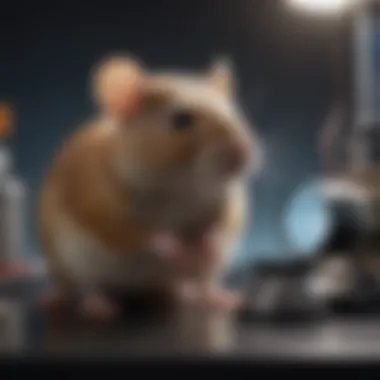The Rodent Guys: Unraveling Rodent Research Insights


Intro
Rodents have long been an integral part of scientific study. Their role extends beyond being mere subjects; they serve as models to understand complex biological systems, social interactions, and ecological dynamics. This article explores the myriad contributions of professionals, often referred to as "the rodent guys," who utilize these creatures in a variety of research settings.
As we probe deeper, we will uncover how these experts bridge the gap between rigorous scientific research and everyday applications. Through this inquiry, we aim to provide insight for students, educators, and enthusiasts alike, illustrating the importance of rodents in both ecological and experimental contexts.
Research Overview
Summary of Key Findings
Research on rodents has revealed numerous significant insights involving genetics, behavior, and environmental adaptability. Studies indicate that rodents can model human diseases, offering crucial information about conditions like diabetes, cancer, and neurodegenerative diseases. Moreover, the latest findings showcase how rodent behavior can give clues about social dynamics and predator-prey interactions in ecosystems, enriching our understanding of biological interconnectedness.
Importance of the Research in Its Respective Field
The implications of rodent research are broad and impactful. By employing rodent models, researchers can reproduce complex biological phenomena within a controlled environment. For instance, the use of laboratory mice has been pivotal in unveiling intricate genetic pathways and responses to therapeutics, ultimately informing human health research. Such research not only provides benefits to the scientific community but also helps in understanding and preserving ecological balance.
Methodology
Description of Experimental or Analytical Methods Used
Researchers often deploy various methodologies when working with rodents. Common experimental designs include behavioral tests, genetic analyses, and ecological surveys. Behavioral experiments, for instance, may evaluate the impact of environmental changes on social interactions or stress responses. Genetic studies can identify correlations between inherited traits and disease susceptibility, often utilizing techniques like CRISPR for gene editing.
Sampling Criteria and Data Collection Techniques
The selection of appropriate rodent strains is critical for ensuring reproducibility and relevance in studies. For behavioral research, scientists typically choose strains that exhibit distinct traits pertinent to their hypothesis. Data collection techniques vary, including observational studies, automated tracking systems, and physiological assessments. These careful selections assure that findings can provide meaningful insights into broader biological questions.
"Understanding the role of rodents in research is not simply about studying them; it’s about unlocking secrets that guide fundamental biological knowledge."
The integration of these methods constructs a robust framework for exploring the ecological roles of rodents and highlights their contribution to diverse scientific domains.
Prolusion to Rodent Research
The importance of rodent research cannot be overstated. Rodents serve as pivotal models in biological research, contributing extensively to our understanding of genetics, behavior, and disease mechanisms. Their physiological similarities to humans make them invaluable in illustrating complex biological processes. This section aims to underscore the necessity and relevance of these studies, delineating the benefits they confer on both scientific inquiry and practical applications.
Understanding the Relevance of Rodents
Rodents, particularly mice and rats, are central to a variety of research domains. They are widely used in studies addressing human diseases, including cancer, diabetes, and neurological disorders. Their relatively short life cycles allow researchers to observe effects over generations, thereby providing insights into genetic inheritance and evolutionary biology. The capacity for controlled breeding enables scientists to standardize studies. This aspect is crucial for drawing reliable conclusions and correlating findings across multiple experiments.
"The adaptability and prolific nature of rodents render them the ideal subjects for a range of biological inquiries, bridging the gap between laboratory research and real-world applications."
Beyond pure scientific investigation, rodents are also used in developing pharmaceuticals. They play a critical role in preclinical testing, where potential drug compounds are evaluated for efficacy and safety. This testing phase is essential for identifying suitable candidates for human trials, thus streamlining the process of therapeutic development. Educators, as well as students, find rodent studies beneficial for practical learning. They demonstrate fundamental biological principles such as behavior, genetics, and ecology in tangible ways.
Historical Context and Evolution of Rodent Studies
The history of rodent research dates back centuries. Initially, these small mammals were utilized primarily in laboratories to study infection and disease transmission. Over time, they became indispensable in various research fields and even contributed to pivotal discoveries. The launch of modern genetics in the early 20th century marked a significant turning point. Researchers began to exploit the genetic similarities between rodents and humans, amplifying the depth of insights derived from these experiments.
In the post-World War II era, advancements in laboratory techniques and technologies propelled rodent studies further. Researchers developed sophisticated methods for genetic manipulation and behavioral analysis, broadening the scope of inquiry and leading to groundbreaking findings in neurobiology and physiology.
Today, rodent models are not only prominent in laboratory settings but also in ecological studies. Their importance in maintaining ecological balance is acknowledged, adding another layer to their value in research. The ongoing exploration of these creatures continues to refine our understanding of biological processes and their applications in human health.
The Ecological Importance of Rodents
Rodents, often overlooked or underestimated, play a crucial role in maintaining the ecological balance. Their presence in various habitats contributes significantly to the overall health of ecosystems. This section discusses the multifaceted functions of rodents, emphasizing their importance not only to biodiversity but also to various ecological processes.
Rodent Roles in Ecosystems
Rodents serve essential roles within ecosystems, acting as both prey and competitors. They are fundamental to numerous food webs, providing sustenance for carnivores like foxes and owls. Additionally, rodents engage in seed dispersal, which aids in plant reproduction and growth. By consuming seeds and fruits, they facilitate the regeneration of diverse plant species, supporting both flora and fauna.
Furthermore, many rodents, such as the eastern grey squirrel and the deer mouse, help in soil aeration. Their burrowing activities enhance nutrient circulation in the ground, promoting plant health. In areas prone to erosion or degradation, effective rodent populations can expedite ecosystem recovery.
"Rodents contribute to the intricate web of life, affecting a wide range of biological functions and ecological stability."
Interactions with Other Species
The relationships that rodents develop with other species demonstrate their ecological significance. They engage in mutualistic associations with some plants, where both species benefit. For example, by feeding on certain plants, rodents help with germination and spread, fostering plant diversity.


Moreover, rodents are key in the interaction with predators. Their population dynamics are often used as indicators of ecosystem health. When rodent populations undergo fluctuations, they can signal changes in vegetation density, predation effects, and even climate impacts. These interactions provide valuable insights for researchers and conservationists, guiding habitat management strategies.
In summary, rodents are integral to ecosystem dynamics. Understanding their roles can reveal critical information about ecosystem function and resilience, underscoring their importance in scientific research. This knowledge is vital for conservation efforts and ecological studies.
The Scientific Method in Rodent Research
The scientific method provides a structured approach to inquiry that is essential in rodent research. This method focuses on formulating hypotheses and systematically testing them. Rodents play a vital role in various scientific fields, particularly in biological and medical research. Implementing the scientific method not only enhances the credibility of findings but also strengthens their applicability in real-world situations.
By utilizing this structured approach, researchers can ensure that their studies are repeatable, transparent, and can contribute to accumulating knowledge over time. Thus, understanding the scientific method is paramount for any successful research project involving rodents.
Formulating Research Questions
Formulating robust research questions is the cornerstone of successful rodent studies. A well-defined question directs the focus of the research and determines the methodology employed. Considerations while creating questions include specificity, feasibility, and relevance. Researchers often begin with broad concepts related to rodent behavior, physiology, or ecology and narrow these down to specific queries that can be tested.
For instance, a research question may examine the impact of environment on rodent reproductive patterns. By asking precise questions, researchers can design experiments that yield meaningful results. Engaging with the literature can also help refine these questions and link them to existing knowledge.
Experimental Design in Rodent Studies
Experimental design is a critical step in rodent research, where researchers plan how to test their hypotheses effectively. This involves deciding on the methods for selecting subjects, assessing variables, and establishing control groups. A good design considers the balance between internal and external validity.
In rodent studies, common experimental designs include:
- Controlled experiments: Isolate specific variables to determine their effects on rodents.
- Longitudinal studies: Observe changes over time within the same group of rodents.
- Cohort studies: Group rodents with shared characteristics and track outcomes across different conditions.
The design phase is where potential ethical concerns must also be addressed. Each aspect, including habitat, social interactions, and welfare, must be carefully considered.
"A well-structured experimental design enhances the reliability of results and ensures that the findings can be generalized beyond the studied population."
Employing a rigorous experimental design framework not only contributes to scientific merit but also aids in addressing ethical considerations in rodent research.
Rodents as Model Organisms
Research has shown that rodents are vital to the field of scientific inquiry. They are not just common pets or pests; they serve as model organisms that provide insights into various biological processes. The use of rodents in research is extensive because they share significant genetic, biological, and behavioral similarities with humans. These similarities allow scientists to study human diseases, genetics, and treatments effectively.
Genetic Studies and Discoveries
Rodents, particularly mice and rats, have played a crucial role in genetic research. Their genomes have been sequenced, opening pathways for understanding gene functions and interactions. As a result, researchers can create genetically modified strains that mimic human genetic disorders. This has led to remarkable discoveries regarding conditions such as cancer, diabetes, and neurodegenerative diseases.
- Transgenic Models: The creation of transgenic mice has revolutionized our understanding of gene functions. These models help researchers study specific genes implicated in diseases. Such studies have improved our understanding of tumor growth and potential treatments.
- Knockout Models: Scientists also use knockout models, where specific genes are disabled. This approach helps in understanding the gene's role in health and disease. For instance, by studying mice lacking certain genes, researchers can uncover critical information about metabolic processes.
Importantly, these models allow for controlled and repeatable experiments, which are essential for robust scientific conclusions.
Behavioral Research Implications
Behavioral research involving rodents is extensive and varied. Rodents exhibit a range of behaviors, making them suitable for studying psychological and neurological conditions.
- Cognitive Studies: Rodents demonstrate learning and memory skills, which researchers can assess through various tasks. For example, mazes or operant conditioning setups test their cognitive abilities. These studies can parallel human cognitive disorders, offering valuable insights into diseases such as Alzheimer's.
- Anxiety and Stress Response: Rodents react to stress in ways that mimic human anxiety responses. Research into their behavior under stress has implications for understanding anxiety disorders. Analyzing how rodents behave in unfamiliar environments lends insight into potential treatments for anxiety in humans.
"Rodents serve as a bridge in understanding complex biological systems, allowing scientists to translate animal research into valuable medical advances for humans."
In summary, the importance of rodents as model organisms cannot be overstated. Their role in genetic and behavioral studies significantly advances our understanding of health and disease. This research not only enhances scientific knowledge but also informs medical practice, demonstrating the critical intersection between rodent studies and human health.
Contributions of 'The Rodent Guys'
In examining the important contributions of 'The Rodent Guys', one can appreciate the vital role that these professionals play in the field of rodent research. Their efforts bridge the crucial gap between scientific inquiry and practical applications. This section delves into specific elements that highlight their innovation, outreach, and educational impacts.
Innovative Techniques in Research
'The Rodent Guys' have introduced several innovative techniques that have transformed how rodent research is conducted. By leveraging advances in technology and methodologies, they have paved the way for more precise and efficient studies. Some notable techniques include:
- Infrared Tracking Systems: Using these systems allows researchers to monitor rodent movements with minimal disturbance to their natural behavior. This enables a more accurate understanding of their interactions in various environments.
- Genomic Editing Tools: Employing tools such as CRISPR, 'The Rodent Guys' can modify genetic structures in rodents. This has significant implications for studying hereditary diseases as well as for developing therapies.
- Behavioral Analysis Software: Advanced software programs can analyze rodent behavior patterns in real-time. This provides deeper insights into social interactions and learning processes, which can relate to human behaviors.


These techniques not only enhance the quality of research but also increase the reproducibility of results. The emphasis on collaboration with other disciplines further enriches the research landscape.
Public Perception and Education
Public perception plays a significant role in the advancement of rodent research. 'The Rodent Guys' have implemented various strategies to educate the public and foster a positive view towards rodent studies. Their efforts can be summarized as follows:
- Community Workshops: These workshops serve to demystify the research process, showcasing the importance of rodents in scientific development. By engaging with local communities, they promote understanding and acceptance.
- Social Media Campaigns: Utilizing platforms like Facebook and Reddit, 'The Rodent Guys' share their findings and insights, reaching a broader audience. This not only informs the public but also encourages discussions about the ethical considerations and benefits of rodent research.
- Educational Partnerships: Collaborations with schools and universities represent an important step in molding future researchers. Through these partnerships, they provide resources and mentorship to students, fostering the next generation of scientists.
"Education is a powerful tool. It transforms perceptions and empowers future generations to understand the value of all forms of research, including rodent studies."
Advancements in Rodent Research Technology
The field of rodent research is continually evolving. These advancements are significant, offering transformative benefits to various studies. As researchers strive to gain deeper insights into genetic, behavioral, and ecological aspects of rodents, the technologies they employ are crucial. This section focuses on the importance of these advancements, as well as the specific tools and approaches that have emerged in this domain.
Genomic Tools and Approaches
Genomic tools have revolutionized the way scientists study rodents. With methods like CRISPR-Cas9, researchers can edit genes with high precision. This capability enables detailed investigation into the impact of specific genes on health and behavior. The use of next-generation sequencing allows for rapid discovery of genetic variations. Such tools provide a comprehensive understanding of the rodent genome, thereby facilitating studies relevant to human diseases.
Some key advancements in genomic techniques include:
- Whole Genome Sequencing: Provides complete insights into genetic make-up.
- Genomic Editing: Allows targeted alterations, showing implications for gene function.
- Gene Expression Analysis: Identifies which genes are actively expressed under various conditions.
These methods enhance the relevance of rodent models in medical research, as they can provide crucial data that informs human health issues.
Advanced Monitoring and Observation Techniques
Observation techniques have seen significant enhancements, allowing researchers to monitor rodent behavior in controlled settings more effectively. Advanced imaging technologies and tracking systems contribute to detailed data collection in real time.
Here are notable technologies being utilized:
- Telemetry: Tracks physiological parameters and movement of rodents. This method offers real-time data on health and behavior.
- Automated Behavioral Analysis: Systems such as home-cage monitoring automate the assessment of rodent behaviors. They enable researchers to collect extensive data without direct interaction.
- Video Footage with AI Analysis: Machine learning algorithms analyze video recordings of rodent activities, providing valuable insights into social interactions and stress responses.
These advanced techniques enhance the scientific rigour of rodent studies, allowing for a more profound understanding of their behavior and interactions in various environments.
The integration of innovative technologies in rodent research is crucial for advancing our understanding of both rodent models and their implications for human medicine.
Ethical Considerations in Rodent Studies
In the field of rodent research, ethical considerations remain a critical topic. Understanding the implications of conducting studies on rodents involves recognizing the balance between scientific advancement and moral responsibilities. Ethical considerations must guide researchers as they engage with living organisms, ensuring their work upholds the principles of animal welfare while producing valuable findings.
Animal Welfare Standards
Animal welfare standards serve as a benchmark to ensure that rodents are treated humanely during research. Various organizations worldwide, such as the American Veterinary Medical Association and the Federation of European Laboratory Animal Science Associations, provide guidelines that researchers must adhere to. These standards encompass a range of practices aimed at minimizing suffering and distress in laboratory rodents.
One of the most significant aspects is the justification for using these animals in research. Researchers need to demonstrate that the potential benefits of the study outweigh any harm inflicted on the subjects. Moreover, ensuring that housing conditions for these animals meet their psychological and physical needs is crucial. For example, proper enrichment, adequate space, and social interaction where applicable can enhance the well-being of the animals. The emphasis on welfare standards reflects a growing awareness of the complexities and sensitivities in rodent studies.
Balancing Research Needs with Ethical Practices
Balancing the requirements of conducting meaningful scientific research with ethical practices is a notable challenge faced by researchers. While the pursuit of knowledge drives experimentation, it is vital to navigate these waters carefully. Ethical frameworks guide researchers to consider alternatives when possible, such as the use of in vitro models or computer simulations instead of live animals.
In situations where using rodents is necessary, researchers often rely on the principles of the 3Rs — Replacement, Reduction, and Refinement.
- Replacement: Seeking alternatives to animal models when viable.
- Reduction: Minimizing the number of rodents used in studies while ensuring robust scientific validity.
- Refinement: Enhancing techniques and procedures to minimize pain and distress experienced by the animals.
Ultimately, the objective is to advance scientific understanding while committing to ethical integrity. Researchers must engage with institutional review boards and continuous ethical training programs to keep abreast of best practices and evolving standards. Monitoring and evaluation of ongoing studies play a significant role as well. By fostering an environment of ethical consideration, the integrity of rodent research is preserved, providing robust outcomes that can lead to valuable insights for various scientific pursuits.
"The ethical dimension of research not only protects the subjects but also enhances the credibility and reliability of scientific findings."
As this section outlines, the importance of ethical considerations in rodent studies cannot be overstated. It remains a balance of advancing knowledge while respecting the rights and welfare of the animal subjects involved. Maintaining these standards and frameworks nurtures a respectful approach in the ongoing work of 'the rodent guys.'
For further details on ethical standards and guidelines, refer to Wikipedia or Britannica.


Impacts of Rodent Studies on Human Medicine
Rodent studies have a significant impact on human medicine. These small mammals are often used in research due to their genetic, biological, and behavioral similarities to humans. The relevance of using rodents in medical studies cannot be overstated. They help in understanding various diseases and testing new treatments, making them indispensable in the field.
Disease Models and Drug Testing
Rodents are particularly valuable in modeling human diseases. Common diseases like diabetes, cancer, and heart disorders can be replicated in rodent models. By inducing these conditions in rodents, researchers can observe the progression of the disease in a controlled environment. This method is crucial for drug testing as it allows scientists to determine the safety and efficacy of new medications before introducing them to human trials.
For example, New Drug Development often involves initial tests on rodents. These tests help in assessing the pharmacodynamics and pharmacokinetics of the drug. Understanding how a drug interacts with a living system is essential in predicting human responses.
"Rodent models provide a glimpse into the complexities of human health, allowing for a foundational understanding crucial for breakthroughs in medicine."
Additionally, the cost-effectiveness of using rodents is notable. Maintaining a rodent colony is less costly than human clinical trials. As a result, many preliminary studies can be done more efficiently, paving the way for more refined human trials later.
Understanding Neurological Disorders
The use of rodents in studying neurological disorders is particularly critical. Disorders like Alzheimer’s and Parkinson’s have complicated mechanisms that are still not fully understood. Rodent models allow scientists to explore these diseases at a biological level. By studying the genetic makeup and modifications in these rodents, researchers can uncover new insights into disease mechanisms and potential therapeutic strategies.
Rodents are often subjected to various tests to assess their cognitive functions and motor skills. These assessments help scientists evaluate the impact of therapeutic interventions on neurological outcomes. Moreover, the effects of treatments can be monitored over time, providing substantial data on long-term efficacy.
Research involving rodents in this way supports further investigations into potential drug candidates that may alleviate or reverse symptoms of neurological diseases. This growing understanding of rodent behavior and biology significantly advances the field.
In summary, the combined insights from disease models and studies of neurological disorders highlight the essential role of rodent research in human medicine. The continuous evolution of methodologies and findings ensures that the interface of research with practical applications remains robust and impactful.
Challenges Faced in Rodent Research
Research involving rodents encounters several challenges that can impact the outcomes and relevance of scientific work. These challenges are not merely administrative; they have profound implications for the integrity and applicability of research findings in various fields. Understanding these challenges is essential for both researchers and stakeholders invested in rodent studies.
Funding and Resource Allocation
Securing adequate funding is one of the most significant hurdles in rodent research. Many funding bodies allocate resources based on current public interest or trending scientific inquiries. As a result, rodent research may sometimes receive less attention compared to other areas. This can lead to limited access to cutting-edge technology and essential resources needed for comprehensive studies.
Moreover, the allocation of resources often does not prioritize rodent research, which results in several researchers competing for limited funds. This scenario may hinder long-term studies that require steady financial support. When funding is scarce, researchers might not be able to pursue more innovative or expansive research projects that could yield significant discoveries.
"The lack of financial resources can constrain the scope of scientific exploration, underlining the need for a more focused approach to funding rodent studies."
Additionally, budget constraints can cause delays in research timelines, which impede progress essential for timely discoveries. If researchers cannot secure the necessary funding, they may be limited to conducting smaller scale studies with minimal impact. Overcoming these funding challenges is crucial for advancing the field.
Reproducibility in Scientific Research
Another challenge that significantly affects rodent research is reproducibility. In scientific terms, reproducibility refers to the ability to consistently replicate experimental results when following the same methodologies. High reproducibility is a cornerstone of robust scientific inquiry, and when it is lacking, it raises questions about the validity of research findings.
Rodent studies often encounter issues that can affect reproducibility. Variations in animal handling, environmental conditions, and even genetic backgrounds can contribute to differing outcomes in experiments. For instance, two labs might observe different results using the same strain of mice if their housing conditions or feeding regimens are not consistent.
To address these issues, there must be a clear and standardized protocol among researchers. Implementing rigorous methodologies and thorough documentation of experimental conditions can help in achieving more reliable and reproducible results. Still, the challenge remains, as differences in individual laboratory environments continue to impact study outcomes.
Future Directions in Rodent Research
Future directions in rodent research are crucial for understanding complex biological systems and addressing pressing ecological and health concerns. As scientists continue to unravel the mysteries surrounding these small mammals, it becomes evident that their role extends beyond mere subjects of study. Emerging technologies and interdisciplinary approaches are shaping the future of rodent research, ultimately enhancing both scientific knowledge and practical applications. The potential benefits are significant, spanning improvements in human health, conservation efforts, and ecological balance.
Emerging Trends in Animal Studies
Innovative trends in animal studies are influencing rodent research profoundly. One prominent trend is the increased application of genomic tools. The advent of CRISPR technology is altering how researchers manipulate rodent DNA, allowing for precise genetic modifications. These advances facilitate the investigation of gene function and its relation to various diseases. With this level of detail, scientists can better understand the genetic basis of conditions such as diabetes or cancer.
Another trend is the push for data-driven approaches. Utilizing big data and artificial intelligence enables researchers to analyze vast amounts of behavioral data from rodent studies. For example, animal behavior tracking technologies provide insights into social interactions and stress responses, aiding in the development of models that predict how humans might react in similar circumstances. This shift toward quantitative analysis supports more robust conclusions in the realm of behavioral research.
"The integration of advanced technologies into rodent research is not just a trend; it's a necessity for the evolution of scientific inquiry."
Collaborative Research Initiatives
Collaboration stands as another pillar for future growth in rodent research. Interdisciplinary teams combining expertise from fields like genetics, ecology, and neuroscience promote a more holistic understanding of how rodents interact with their environments. Initiatives such as collaborative consortia can pool resources, allowing researchers from various institutions to share findings and methodologies. This collaborative spirit enhances the overall quality of research and fosters innovation.
Moreover, community engagement is gaining traction as researchers seek to promote understanding of rodent studies beyond academic settings. By partnering with schools and local governments, researchers can cultivate awareness about the ecological significance and welfare of rodents. This outreach can lead to better public support for research initiatives and conservation efforts.
Looking forward, these collaborative efforts create a fertile ground for discoveries that can lead to groundbreaking applications in health sciences, pest management, and environmental conservation. As collective knowledge expands, it lays the foundation for addressing complex questions and challenges that face the scientific community today.
In summary, the importance of future directions in rodent research cannot be overstated. By embracing emerging trends and fostering collaborative initiatives, scientists can unlock new possibilities that will benefit both human health and ecological systems.







